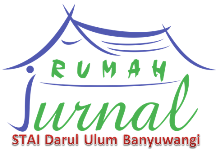Pemberdayaan ekonomi masyarakat Desa sumberberas muncar banyuwangi Berbasis pesantren melalui program kredit mikro (Studi Lembaga Keuangan Mikro Syariah di Pesantren Minhajut Thulab)
Abstract
This study aimed to describe empirically microcredit programs in economic empowerment. The focus of the study in this research describe the shape of community economic empowerment programs through micro-credit programs, barriers and support in implementing micro-credit programs, as well as the impact of micro-credit programs in improving the local economy.This research is a field and include qualitative research, by making Islamic microfinance institutions in boarding Minhajut Thulab as a case study. The findings in this study indicate that microcredit programs provided without collateral, the obstacles is the lack of human resources is found even with the support in the form of the entry into force of the one door system. Improved economy through micro-credit programs internally can be felt by boarding schools, but externally not fully felt by the community. Key Word: Economic Empowerment, Microcredit, LKMS.
Published
2017-06-24
How to Cite
Mursidah, M. (2017). Pemberdayaan ekonomi masyarakat Desa sumberberas muncar banyuwangi Berbasis pesantren melalui program kredit mikro (Studi Lembaga Keuangan Mikro Syariah di Pesantren Minhajut Thulab). Economic: Journal of Economic and Islamic Law, 6(1), 34-52. Retrieved from https://ejournal.kopertais4.or.id/tapalkuda/index.php/economic/article/view/2911
Section
Articles
Copyright (c) 2017 Economic: Journal of Economic and Islamic Law

This work is licensed under a Creative Commons Attribution-ShareAlike 4.0 International License.
Authors who publish with this journal agree to the following terms:
- Authors retain copyright and grant the journal right of first publication with the work simultaneously licensed under a Creative Commons Attribution License that allows others to share the work with an acknowledgement of the work's authorship and initial publication in this journal.
- Authors are able to enter into separate, additional contractual arrangements for the non-exclusive distribution of the journal's published version of the work (e.g., post it to an institutional repository or publish it in a book), with an acknowledgement of its initial publication in this journal.
- Authors are permitted and encouraged to post their work online (e.g., in institutional repositories or on their website) prior to and during the submission process, as it can lead to productive exchanges, as well as earlier and greater citation of published work (See The Effect of Open Access).






